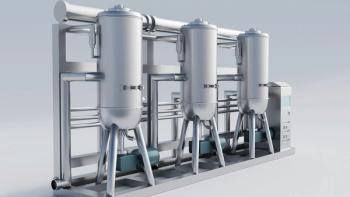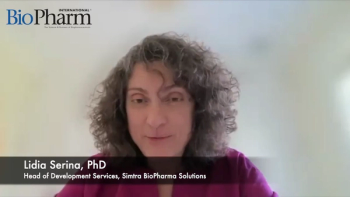
The acquisition of Rweality will strengthen Enosium Life Science’s market access and medical-economic development strategies.
Feliza Mirasol is the science editor for BioPharm International.

The acquisition of Rweality will strengthen Enosium Life Science’s market access and medical-economic development strategies.

The EMA has issued a new proposal that aims to encourage biosimilar development and improve patient access to biosimilar therapies.

Rising demand for peptide-based therapeutics prompts the launch of this new peptide research center, which will offer services across peptide synthesis, discovery, and advanced modalities.

Wider adoption of single-use technologies and systems is aligning with sustainability goals for the industry.

Sitting down with the PharmTech Group at INTERPHEX 2025, Michael Franco, global sales director at PSG Biotech, discussed the recent advancements in pharmaceutical flow sensor technology.

The shift toward personalized medicines poses new challenges in cleanroom protocols.

Nicole Hunter, head of Global WMArchitect at WMFTS, sat with the PharmTech Group at INTERPHEX 2025 to discuss the industry initiative around single-use assembly components that was prompted by the supply disruptions caused by the COVID-19 pandemic.

At INTERPHEX 2025, the PharmTech Group spoke with Dave Loula, global product director, ITT Engineered Valves, about innovation in advanced sensing technologies that answer customers' need for reliable valve function.

Christopher Murphy, director of Global Business Development and Service Customer Support at Environmental Specialties, sat down with the PharmTech Group at INTERPHEX 2025 to discuss the design and critical role of walk-in chambers in the bio/pharmaceutical industry.

Speaking at INTERPHEX 2025, William Wainwright, business development manager at Iwata Label USA, discusses the practical benefits of functional labels in protecting parenteral drugs.

Officially launched at INTERPHEX 2025, the Omni ASCENT is a next-generation off-site manufactured vertical utility solution that offers optimized cleanroom flexibility and efficiency.

BioPure’s BioClamp connector has been upgraded and is now manufactured to be 13% lighter than the previous model, allowing users to achieve a 26% reduction in carbon dioxide emissions across the full lifecycle of a product.

With up to 88 channels, the CytoFLEX mosaic Spectral Detection Module offers enhanced detection.

Sherwin-Williams will showcase its advanced coating systems, which are designed to ensure safety, sterility, and efficiency in pharmaceutical manufacturing environments.

Having completed its €40 million (US$43 million) investment in Slovenia, Novartis has opened its first specialized viral vector production facility in Europe, following earlier significant investments in R&D that has driven the growth of Slovenia’s workforce.

The £10 million (US$13 million) investment is part of a larger £58 million (US$75 million) Series A financing round to be used for the development of Maxion Therapeutics’ preclinical lead program for treating inflammatory diseases.

The commission’s approval makes durvalumab the first and only immunotherapy for LS-SCLC in the EU.

The addition of the two larger-volume bioreactor sizes to Cytiva’s Xcellerex X-platform portfolio will allow scientists and researchers to scale up from 50 L to 2000 L to meet growing demand for clinical trials and regulatory approved products.

With the investment, AstraZeneca will establish a second global strategic R&D center in Beijing as well as support major research and manufacturing agreements to further advance life sciences in the country.

Curia plans to expand its sterile fill/finish capabilities at its Glasgow, UK, site and gives updates on an ongoing expansion at its Albuquerque, NM, site.

Christine Mya-San, global account manager at Roquette Pharma Solutions, discusses the most significant pharma ingredients at play over the past year and looks ahead at ingredient innovation.

Russell Miller, vice-president of Global Sales & Marketing at Enzene, discusses how continuous bioprocessing is at the forefront of changing biologics manufacturing moving forward.

Lidia Serina, PhD, head of Development Services at Simtra BioPharma Solutions, discusses the challenges with maintaining aseptic integrity in the manufacturing of sterile injectable pharmaceuticals.

Under the agreement, Shilpa will undertake development and commercial supply for a novel checkpoint inhibitor for immuno-oncology indications.

In the second half of an interview with Edwin Stone, PhD, CEO of Cellular Origins, Stone discusses how automation in CGT manufacturing can increase productivity without displacing human workers.

The Therapeutic Goods Administration (TGA) of Australia confirmed its initial decision to decline approval of the mAb for treating early Alzheimer’s disease.

Edwin Stone, PhD, CEO of Cellular Origins, offers his unique perspective to the challenges facing CGT manufacturers, drawing on his background in robotics and life science automation.

Advances in automation technologies and bioprocessing equipment are driving fuller adoption of automation in biomanufacturing.

The committee’s recommendation is based on results from a Phase III trial in which Imfinzi demonstrated a reduced risk of recurrence, progression, or death by 32% compared to neoadjuvant chemotherapy alone.

The investment, led by Foresight Group and secured alongside funding from PARP, will be used to further commercialize uFraction8’s microfiltration technology.